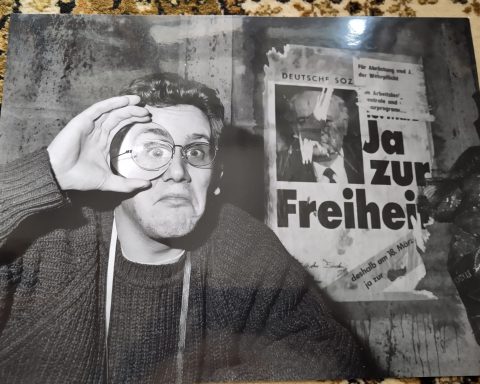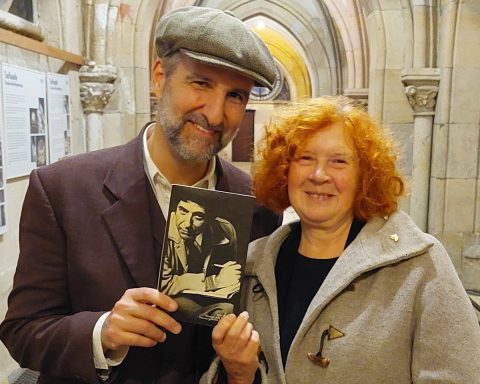
Editor’s note: The idea for this column, which highly encourages readers’ contributions, came from conversations between me and Leipzig Writers Diana Feuerbach (a German novelist) and Canadian Christijan Robert Broerse (prolific writer and LeipGlo’s literature columnist). The idea is for people to share their transnational cultural experiences – a past and present involving personal relationships where our sense of belonging, country and background intersect with another, or multiple others, in deeply personal ways that imprint feelings and memories and shape us and change us in some important way.
The debut of the aptly-named #GoingGlocal column (thanks, Christijan!) features “Thank you for your letter,” a five-part series in which Diana talks about her relationship to Russia and all things Russian. Raised in the East-German city of Karl-Marx-Stadt (today’s Chemnitz), she recounts her childhood perceptions of the Red Army occupation, Russian lessons at school as well as her friendship to a girl her age, a pen pal from the city of Leningrad. The series will run every Saturday for the next five weeks.
“Thank you for your letter,” Part I: Crazy Lipstick
By Diana Feuerbach
The first Russian I saw in real life was a woman wearing a formal skirt and a blouse. Someone had presented her with a slim bouquet of flowers. It may have been at the Karl Marx monument, called Nischl (noggin) by the locals. I don’t remember the details. My class had been commandeered to the city center as a living Winkelement—warm bodies used for waving during parades. We were to welcome a delegation from the city of Volgograd. What could be more convincing on such occasions than waving children? The visit was connected to the inauguration of a new road on the outskirts of town. The so-baptized Wolgograder Allee, freshly asphalted, snaked for two kilometers along the frontier of Fritz Heckert Gebiet—a plattenbau monoculture I called home in the 1980s.

The Russian stood far from us. I couldn’t make out any specifics. Only her lipstick struck me: a thin, twin-lined fire in orange, brought out to shine by the sun. I’d never seen such a garish color. Especially not on any mouth. My school friends and I laughed. We thought that orange lipstick was terribly over the top. Did all Russian women walk around like this? Did they have poor taste? Were there no lipsticks in normal colors available? I opted for the latter; I was convinced Soviet stores had nothing decent to sell.
All the while, I secretly admired the stranger from Volgograd. She seemed so … elegant! — a lady who didn’t fit into my mold. Back then, nothing in the whole wide world could possibly be more uncool than the Soviet Union, whose people I equated with the derogatory phrase used by the adults around me: die Russen. Or worse: der Iwan. I owed my childhood idea of them to certain jokes recounting the stupidity and criminal minds of Red Army soldiers. Arriving in Germany at the end of the war, those dummkopfs from the Taiga didn’t grasp that in order to get running water, you needed more than a tap driven into the wall. They tried to wash potatoes in water closets. They stole watches and bicycles. Zappzarapp! They simply took what they liked and what lent itself to bragging back home.
On one hand, the Russians were a laughingstock. On the other hand, they had freed us. Although the word “free” didn’t seem to matter in our dealings with them. On the contrary: They called the shots, coercing us into a lifelong “friendship” with them. They even forced us to learn their language. To that end, I was asked to attend a special school from third grade on. My parents said, No. When the Russian lessons started in the fifth grade of my regular school, nobody got excited.
Russian – what should we learn that for? Our parents listened to music with English lyrics. The Cyrillic letters looked weird; we had to learn how to write all over again. We were full of contempt. ”Ohn idyot”. To us, that didn’t translate into “He walks,” but into “He is an idiot.” What else could it mean? The fact that our teacher was mentally ill (nowadays you’d call someone like him bipolar and admit him into psychiatry) didn’t help much.

At the same time—this is where I myself felt torn in two—I loved Soviet fairytale films. I was so smitten with the witch Baba Yaga, whose cottage was mounted on a chicken foot; I drew pictures of her and secretly rehearsed her lines. For years, I wanted to be nothing but a witch at carnival. During music lessons, when we didn’t have to belt out communist songs, I forgot my aversion too: Prokofiev’s “Peter and the Wolf” delighted me, as did the birthday tune sung by a crocodile playing the concertina. Plus the Russians really knew how to figureskate! That country covering such vast terrains on the roll-up maps in our geography classroom had produced masterpieces—at least in the fields of music, sports, and children’s television.
Then, one day, I got a letter.
(To be continued in Part II, next Saturday…)







![Wine & Paint event on 9 Nov. 2024 at Felix Restaurant, Leipzig. Photo: Florian Reime (@reime.visuals] / Wine & Paint Leipzig](https://leipglo.com/wp-content/uploads/2024/12/pixelcut-export-e1733056018933-480x384.jpeg)

